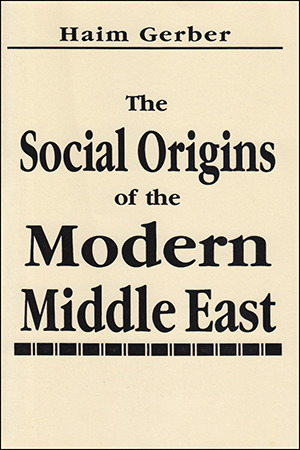
- 1987/223 pages
The Social Origins of the Modern Middle East
"[The book] is bold and is bound to encourage scholars in the direction of large scale comparative work."—International Review of Social History
"An important, provocative, and plausible argument.... Far too few of us are as ambitious, as willing to take risks in print, and as constructively argumentative as this.... genuinely important.... providing a link between contemporary political and social theory and the empirical reality of the Middle East."—International Journal of Middle East Studies
"Courageously challenges some old, well-worn, possibly erroneous views of how the Ottoman Empire formed many present systems of Middle East political power.... Gerber should be congratulated for his vision and his scope."—International Journal of Islamic and Arabic Studies
"A welcome antidote to the all-too-frequent studies of the contemporary Middle East that are written innocent of historical context."—American Historical Review
"This book deserves to be greeted with enthusiasm, and Haim Gerber should be commended for proposing a framework that is sure to generate widespread debate and discussion."—MESA Bulletin
"Highly recommended for college and university libraries."—Choice
"A challenging new interpretation of modern Middle East social history, backed by original research and a wide reading of secondary material.... A fine contribution."—Herbert Bodman
"Focusing on the lands of the former Ottoman Empire...., Gerber seeks to explain why these societies evolved differently from the parliamentary democracies and communist states explained by Moore. He points not to the success or failure of peasant revolutions (as Moore did) but to their absence in the Middle East, an absence caused by the de facto ownership of land in the form of peasant holdings. Gerber's central point is that the agrarian structure of the Ottoman Empire differed from that of other great agrarian states in that no landed upper class emerged within it. Only after the Ottoman land law of 1858 required registry of land did a landed elite evolve.... The unrest that ultimately resulted took the form of army coups in the 1950s. Gerber draws on both his own research in the archives of the Bursa region of western Anatolia and case studies by others.... Highly recommended for college and university libraries."—Choice
- Introduction.
- The Classical Ottoman Land Regime.
- Agriculture and the Land Regime in Seventeenth-Century Anatolia.
- Agrarian Development in the Seventeenth, Eighteenth, and Nineteenth Centuries.
- The Ottoman Land Law of 1858 and Its Consequences.
- Agrarian Developments in Turkey, Iraq, Syria, and Egypt in the Twentieth Century.
- The Agrarian Origins of the Modern Middle East: A Comparative Approach.
- Conclusion.





